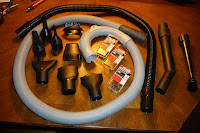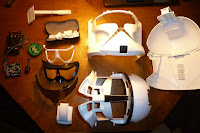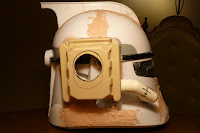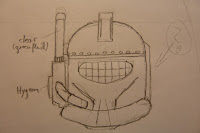Jan 31, 2012
Step 3: Building my first Steampunk Helmet: Filling
 Today I closed most vents and started to give the front of the helmet a smoother surface.
Today I closed most vents and started to give the front of the helmet a smoother surface.The helmet has dozens of small holes and slots and closing many of them changed much of the helmet´s appearance. The front part looks much wider and heavier without the clone trooper mouth.
Remodeling the visor was more difficult than expected and I will prepare better when working on it next time. I hope to be able to remodel the corners of the visor and form a more diving helmet typical shape. My plan is to take away about 1 inch on the sides of the visor and end up with a semi-circle like shape.
Next, I am going to sandpaper the helmet and see where I need to add more filler.
Jan 26, 2012
Step 2: Building my own Steampunk Helmet
Over the course of a week, I gathered a variety of trash and plastic pieces such as pieces of vacuum cleaners, plastic tubes, art materials and painting equipment. The pictures show a few, but not all pieces I gathered. Among the not shown things are test tubes, a hygrometer and many many very small nails, screws and pins.
 With all the pieces available I started experimenting about the final design of the helmet. My goals at this point were to give the helmet a clear outlook that reminds of vintage deep-sea divers o nthe one hand and to mix it with some mystical, futuristic elements on the other hand.
With all the pieces available I started experimenting about the final design of the helmet. My goals at this point were to give the helmet a clear outlook that reminds of vintage deep-sea divers o nthe one hand and to mix it with some mystical, futuristic elements on the other hand.To achieve this design I planned to:
- Close the little vents of the helmet (except a few on the sides) to have a clean deep-sea helmet look.
- The original visor looked too futuristic from today´s perspective. To make it look more suitable for a Steampunk design the visor needed to be less sharp, have less corners and its design should rather follow the needs of a diving helmet, namely be smaller and rounder.
- Many Rivets to hold the helmet together, one of the characteristics of machines and metal works during the Victorian era.
 Beyond these basic goals, I wanted to add some mystical elements, to give the helmet and its owner a more distinct character.
Beyond these basic goals, I wanted to add some mystical elements, to give the helmet and its owner a more distinct character.At this point of the project, I was not completely clear about how to achieve this, but wanted to include some mystical fluids that would seem to be necessary for the owner to survive.
The last picture shows the end of this stage. I glued a plastic box for paint which I cut into shape to the helmet and a tube to visibly connect whatever is going on in the box with whoever is under the helmet.
Jan 25, 2012
Step 1: Building my own Steampunk Helmet
What is Steampunk?
 Steampunk is a phenomena, which started as a literary trend in the 1980ies and later developed into an art genre, cultural movement, style and own subculture. It connects futuristic and technical functions with means and devices of the Victorian era (1837-1901) and envisions a view into the future based on that era. Thus Steampunk involves a setting where the victorian fashion and culture is idealized and steam power is still widely used. Machines often use cog mechanics and characters often have a certain "Do-it-yourself" mentality and a drive for adventures.
Steampunk is a phenomena, which started as a literary trend in the 1980ies and later developed into an art genre, cultural movement, style and own subculture. It connects futuristic and technical functions with means and devices of the Victorian era (1837-1901) and envisions a view into the future based on that era. Thus Steampunk involves a setting where the victorian fashion and culture is idealized and steam power is still widely used. Machines often use cog mechanics and characters often have a certain "Do-it-yourself" mentality and a drive for adventures.
 In the world of today you can find elements of Steampunk in many disciplines, such as movies, games and music. However, there are versatile other varieties of Steampunk that use certain elements, but exclude or change others.
In the world of today you can find elements of Steampunk in many disciplines, such as movies, games and music. However, there are versatile other varieties of Steampunk that use certain elements, but exclude or change others.
Plans for my Steampunk Helmet
 My general idea was to create a diving helmet with some mystical element which sticks out. I had several simple sketches like this one.
My general idea was to create a diving helmet with some mystical element which sticks out. I had several simple sketches like this one.
The basis for the final helmet is a Star Wars clone trooper helmet, which I purchased on ebay. It has nearly no scratches or marks, just some spots where it began to lose paint, what didn´t matter to me. At first I did a throrough cleaning of all its parts before sandpapering the surface of the helmet with a #400 sandpaper. The helmet has several coats of paint and clear varnish and it definetily pays off to create a rough surface. This way glues and paint will stick better on the helmet.
 After sandpapering all parts , I decomposed the helmet completely and took out all electronic parts, the battery box, cables and the speaker. Additionally, I rempved several plastic pieces, such as buttons and the power switch, as it might distract from the smooth and closed surface the subaqua helmet should have.
After sandpapering all parts , I decomposed the helmet completely and took out all electronic parts, the battery box, cables and the speaker. Additionally, I rempved several plastic pieces, such as buttons and the power switch, as it might distract from the smooth and closed surface the subaqua helmet should have.
As I planned to use spray paint, I wrapped the visor in plastic foil to keep it free from scratches and paints.
 Steampunk is a phenomena, which started as a literary trend in the 1980ies and later developed into an art genre, cultural movement, style and own subculture. It connects futuristic and technical functions with means and devices of the Victorian era (1837-1901) and envisions a view into the future based on that era. Thus Steampunk involves a setting where the victorian fashion and culture is idealized and steam power is still widely used. Machines often use cog mechanics and characters often have a certain "Do-it-yourself" mentality and a drive for adventures.
Steampunk is a phenomena, which started as a literary trend in the 1980ies and later developed into an art genre, cultural movement, style and own subculture. It connects futuristic and technical functions with means and devices of the Victorian era (1837-1901) and envisions a view into the future based on that era. Thus Steampunk involves a setting where the victorian fashion and culture is idealized and steam power is still widely used. Machines often use cog mechanics and characters often have a certain "Do-it-yourself" mentality and a drive for adventures. In the world of today you can find elements of Steampunk in many disciplines, such as movies, games and music. However, there are versatile other varieties of Steampunk that use certain elements, but exclude or change others.
In the world of today you can find elements of Steampunk in many disciplines, such as movies, games and music. However, there are versatile other varieties of Steampunk that use certain elements, but exclude or change others.Plans for my Steampunk Helmet
 My general idea was to create a diving helmet with some mystical element which sticks out. I had several simple sketches like this one.
My general idea was to create a diving helmet with some mystical element which sticks out. I had several simple sketches like this one.The basis for the final helmet is a Star Wars clone trooper helmet, which I purchased on ebay. It has nearly no scratches or marks, just some spots where it began to lose paint, what didn´t matter to me. At first I did a throrough cleaning of all its parts before sandpapering the surface of the helmet with a #400 sandpaper. The helmet has several coats of paint and clear varnish and it definetily pays off to create a rough surface. This way glues and paint will stick better on the helmet.
 After sandpapering all parts , I decomposed the helmet completely and took out all electronic parts, the battery box, cables and the speaker. Additionally, I rempved several plastic pieces, such as buttons and the power switch, as it might distract from the smooth and closed surface the subaqua helmet should have.
After sandpapering all parts , I decomposed the helmet completely and took out all electronic parts, the battery box, cables and the speaker. Additionally, I rempved several plastic pieces, such as buttons and the power switch, as it might distract from the smooth and closed surface the subaqua helmet should have. As I planned to use spray paint, I wrapped the visor in plastic foil to keep it free from scratches and paints.
Subscribe to:
Comments (Atom)






